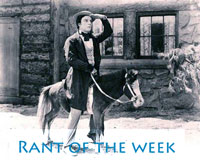
Is Downton Abbey a soap opera?
It started out well. It started out as a period piece, like an
extended "Age of Innocence". Great acting, great filming, lovely sets
and costumes. But then two or three things became clear.
Firstly, that Fellowes wants to recycle certain themes and characters over
and over again-- like a sitcom, basically. Mary just can't make
up her mind about Matthew; Edith's relationships, like Sir Anthony Strallan,
get sabotaged by Mary-- who seems bizarrely stricken by the idea of not
confessing her role in the death of Mr. Pamuk. Mary? Who
earlier mocked her own mother's ideas of propriety and rules?
Suddenly, she's Karen Santorum?
Secondly, it appears that nobody connected with the show wants to spend
the big bucks on a really remarkable scene like (we can only imagine)
Sybil's "coming out" party in London. We're merely told
about the affair. I recommend that you watch this episode carefully,
stop your PVR or DVD player just before the scene in which they discuss the
ball, and then pop "The Leopard" into your DVD player and watch the final
ballroom scene from that movie instead. Then go back to Downton Abbey.
(Dr. Zhivago has one or two great grand ballroom scenes; or try "Russian
Ark", a really extraordinary film that culminates with a fabulous ball.)
[January 30, 2012: there are scenes from the war, but they are rather
chaste and extracted looking. Can't blame them really-- the budget
just isn't there, probably. But I can blame them for the ridiculous
degree of reverence paid to all things military, especially the officers
parading about, whining about how they don't get to serve at the front.
That's not what this war was: it was precisely about officers like that
ordering other people to the front to be maimed and gassed and slaughtered for
reasons that have, as of yet, 100 years later, escaped most people.
More appallingly, if you were not willing to blindly serve in a war with no
purpose, they made you out to be unpatriotic or cowardly. ]
In Episode 8, Season 1, of "Downton Abbey", Bates
is confronted with the accusation that he has stolen some bottles of wine.
Bates says something like, "no one has ever seen me touch a drop since I
came here".
In the so-called science of "statement analysis", this would
be a dead giveaway: he doesn't say he hasn't touched a drop-- only that no
one has seen him. Why does he not say he hasn't touched a drop?
Because he's not sure of that; he's only sure he hasn't been caught yet.
It's as if, accused of murder, the suspect blurts out, "you couldn't
possibly have seen me do it".
Except, in Downton Abbey, we know that
Bates, who is turning into a bit of a sanctimonious character, is as
innocent as the driven snow.
A lot of dramas want it both ways. Thomas and O'Brien are fun to
watch, at first, but it's no fun watching Thomas openly abuse William and
everyone else in the house. In real life, he'd have been sacked very
quickly, but then we wouldn't have had the fun of watching him continue to
needle William and try to frame Bates. Carson and Hughes are too
stupefied to do anything about him?
It's also a bit tedious to see Bates
get away with saying that he can't tell anyone why he was unjustly sentenced
to two years for theft, just that he was, and if they don't like it, they
can fire him. This episode would have been dramatically improved if
Lord Grantham had simply fired him like a plausible character would have.
"Very well. I can't help you if you don't want me to or won't take me
into your confidence. I don't have time for this: I'm afraid you're
sacked."
Daisy, completely out of character, ruins the meals prepared by
Mrs. Bird because Mrs. Patmore asked her to make sure the family misses her
while she's gone getting eye surgery. Daisy is cold-hearted enough to
sabotage the meal, but not sneaky enough to lie about it when confronted?
That might or might not be "possible" but it isn't interesting: it's a
writer strong-arming his own characters into situations that provide
titillating plot developments but undercut character.
I don't mind Sybil
considering a relationship with the chauffeur-- I just don't buy her
behaving like a school girl, as if she has suddenly shucked off 18 years of
upbringing and culture as if it were a hat. Remember -- she did participate
in her own "coming out" party, her "debut". It would have expanded her
character considerably if she had refused.
She has spent every day of her waking
life dealing with servants who are expected to provide for her every need.
It also would have been far more interesting, as a story line, if Robert had had a
chat with the chauffeur once he realized the Sybil has been lying to him about where
she was going. Given his position and character, and given the obvious connundrum Sybil's
dishonesty would present Branson, he might have told the chauffeur
that he was free to use force if necessary to prevent Sybil from attending one of
those dangerous political rallies. That would have created a very interesting
dynamic between the chauffeur, Tom Branson, and Sybil. Or he could have told Branson
that he was not responsible if the lady decided to act wrecklessly. That too would have
been interesting -- Branson "not recommending" that her ladyship proceed and stating
that he "won't be responsible" if something goes wrong, and peevishly parking somewhere to wait for
her. But Fellowes wanted the passing titillation of the argument between the two, Branson urging her to get
back into the car, Sybil, without the slightest condescension, insisting on her own way. It's a
thoughtless, under-developed scene that could have been much more.


